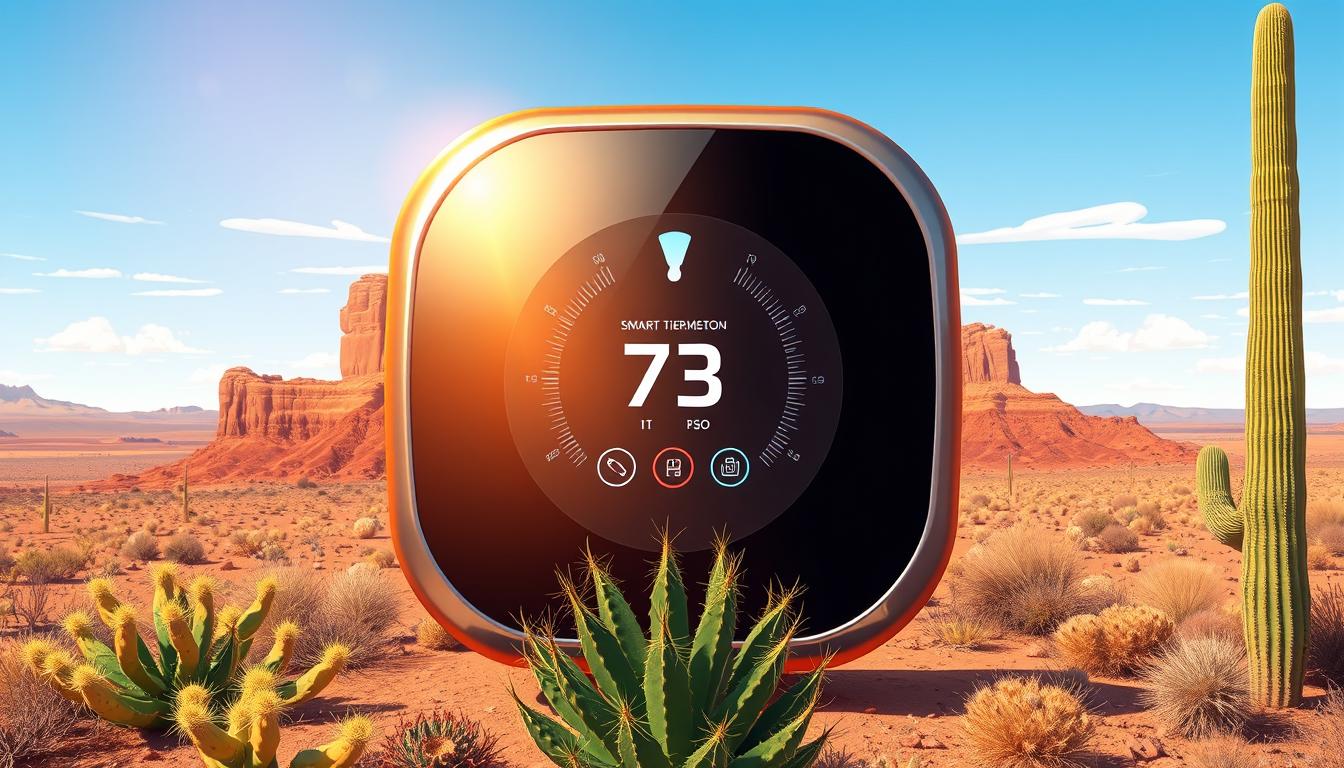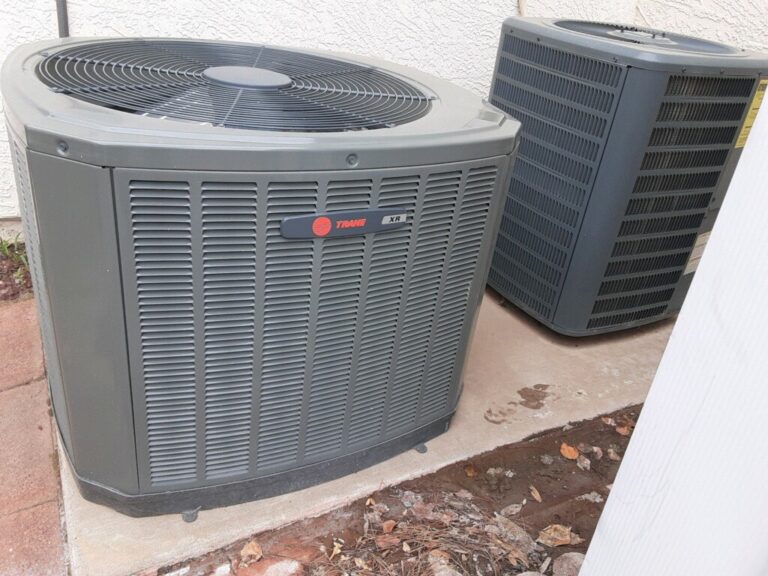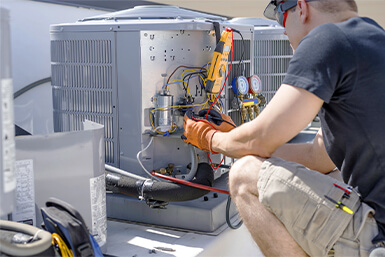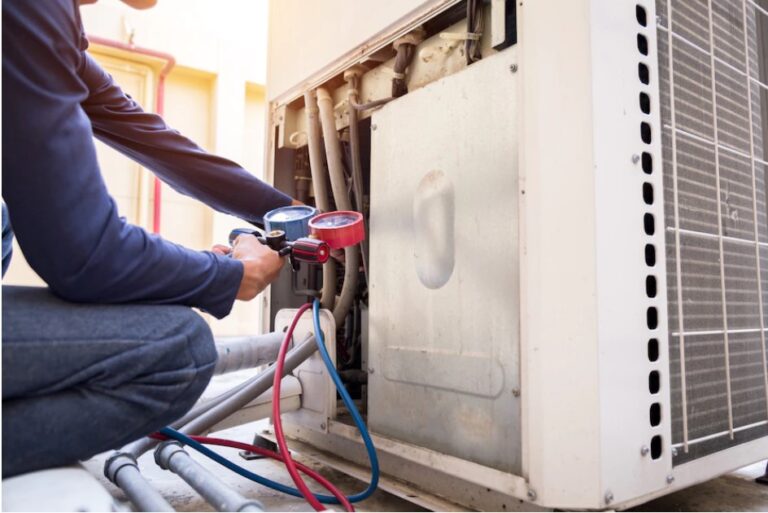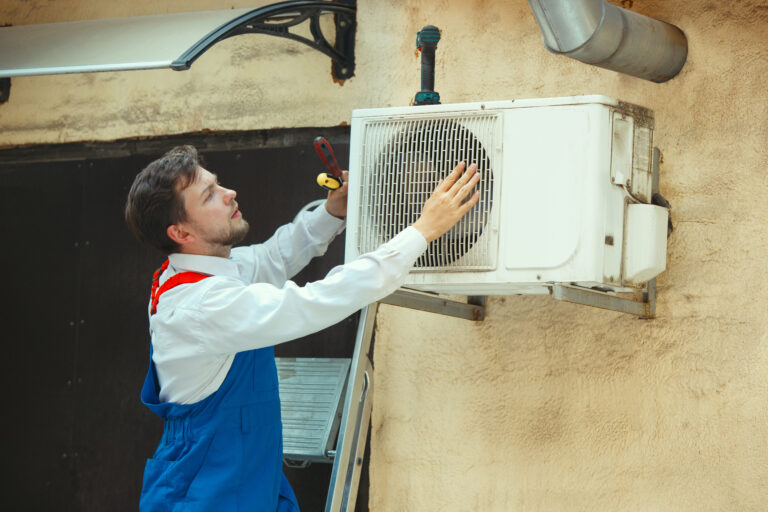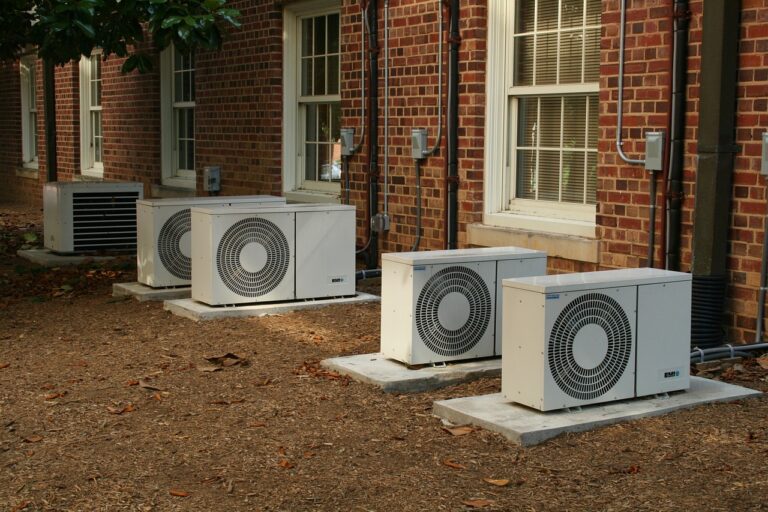Best Thermostats for Managing Extreme Arizona Heat
Living in Arizona can be challenging, especially when summer temperatures soar above 110°F for weeks on end. Managing your home’s climate becomes a top priority, and the right thermostat can make all the difference.
A smart thermostat that you can adjust through an app can shave about 8 percent off your home’s heating and cooling bills, amounting to an average savings of $50 a year, according to Energy Star.
This guide examines the best thermostats suited for Arizona’s desert climate, focusing on models that excel in maintaining consistent temperature control.
Key Takeaways
- Top thermostats for extreme heat conditions
- Features to look for in a thermostat for Arizona homes
- Energy-saving potential of smart thermostats
- Budget-friendly options for effective temperature control
- Premium models with advanced features for optimal comfort
The Challenge of Arizona’s Extreme Heat
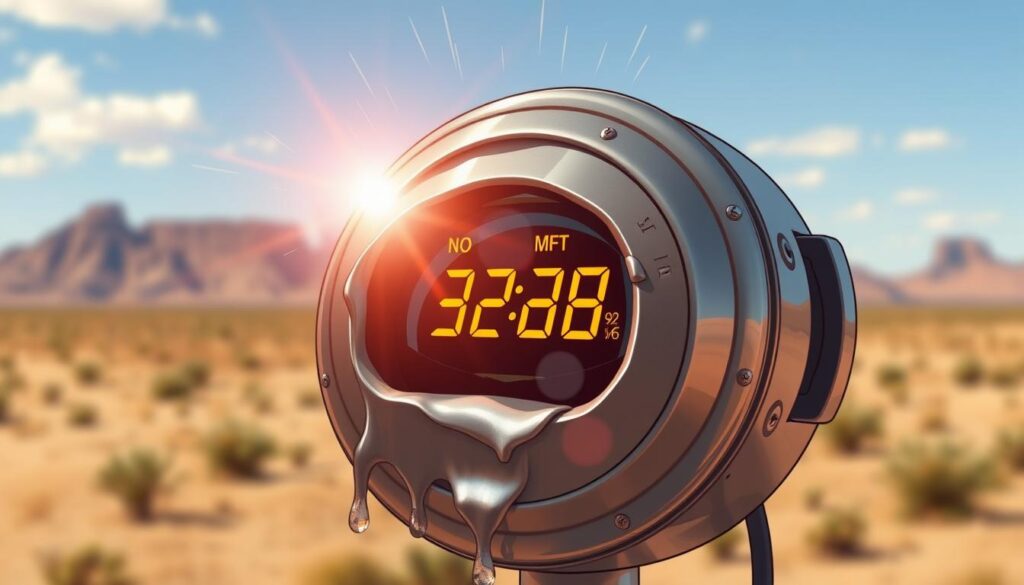
With temperatures often soaring above 110°F in the summer, Arizona’s climate presents unique difficulties for temperature control. The state’s extreme heat conditions put enormous strain on cooling systems, making it challenging to maintain comfortable indoor temperatures.
Understanding Arizona’s Unique Climate Challenges
Arizona experiences some of the most extreme heat conditions in the United States. Summer temperatures regularly exceed 110°F and sometimes reach as high as 120°F. This intense heat creates a high demand for cooling, which can be challenging for standard thermostats to manage effectively.
The extreme climate in Arizona necessitates a thermostat that can handle the unique challenges posed by the desert heat. A suitable smart thermostat can help mitigate these issues by providing more precise temperature control and adapting to the household’s specific needs.
Why Standard Thermostats Fall Short in Extreme Heat
Standard thermostats often lack the precision needed to maintain consistent temperature when outdoor conditions are extreme. They typically measure temperature at only one location, usually in a hallway, which doesn’t account for hot spots in other areas of the home.
- Basic thermostats allow indoor temperatures to fluctuate by several degrees, leading to discomfort and increased energy consumption.
- The simple on/off cycling of basic thermostats can cause your AC to run inefficiently, consuming more energy and resulting in higher utility bills.
- Conventional thermostats can’t anticipate temperature changes or adapt to Arizona’s unique climate patterns.
To effectively manage the extreme heat in Arizona, a more advanced thermostat is necessary. One that can provide precise control, adapt to changing conditions, and offer insights into cooling strategies for maximum efficiency.
Why Smart Thermostats Are Essential for Arizona Homes

In Arizona’s scorching desert climate, smart thermostats have become an essential tool for homeowners looking to manage their energy consumption effectively. The extreme temperatures experienced in Arizona make traditional thermostat systems inadequate for maintaining a comfortable home environment while keeping energy costs in check.
Smart thermostats offer a range of benefits that are particularly relevant to Arizona homeowners. One of the primary advantages is their ability to optimize energy efficiency, especially during the peak summer months when cooling costs can skyrocket.
Energy Efficiency Benefits in Hot Climates
Smart thermostats can significantly enhance energy efficiency in hot climates like Arizona’s. By learning the homeowner’s schedule and preferences, these devices can automatically adjust the temperature to minimize energy waste. According to Energy Star, a smart thermostat can shave about 8 percent off a home’s heating and cooling bills, amounting to an average savings of $50 a year. Some thermostat manufacturers claim that those savings can reach $100 or more.
Key benefits include the ability to pre-cool homes during off-peak rate hours, usage reports that help identify the most expensive cooling days, and maintenance reminders that ensure the HVAC system runs at peak efficiency.
| Feature | Benefit | Impact on Energy Efficiency |
|---|---|---|
| Pre-cooling during off-peak hours | Reduces costs by cooling the home when rates are lower | High |
| Usage reports | Helps homeowners identify and adjust to the most expensive cooling days | Medium |
| Maintenance reminders | Ensures HVAC system operates efficiently by preventing clogged filters and overdue maintenance | High |
Cost Savings During Peak Cooling Seasons
During Arizona’s peak summer months, cooling can account for up to 70% of the energy bill. Smart thermostats can save homeowners $100-200 per cooling season through optimized temperature settings and run times. Additionally, the ability to make temperature adjustments remotely prevents wasteful cooling when plans change unexpectedly.
Some utility companies even offer rebates for smart thermostat installations, providing immediate savings on top of the long-term energy bill reduction. By investing in a smart thermostat, Arizona homeowners can enjoy a more comfortable living environment while saving money on their energy bills.
Key Features to Look for in Thermostats for Arizona Heat
When searching for the ideal thermostat for Arizona’s extreme heat, several key features should be considered to ensure optimal performance and comfort. The right thermostat can significantly impact your home’s cooling efficiency and overall energy consumption.
Temperature Consistency and Precision Control
A thermostat with precise temperature control is crucial for maintaining a consistent indoor climate. Smart thermostats offer advanced temperature control, allowing for adjustments as small as 0.5°F. This precision helps in maintaining a comfortable temperature while avoiding unnecessary energy expenditure.
Remote Sensors for Even Cooling
Remote sensors can significantly enhance the performance of your thermostat by providing real-time temperature data from various parts of your home. This feature is particularly useful in larger homes or homes with multiple stories, where heat distribution can be uneven. By ensuring that your thermostat is aware of the temperature in different areas, you can achieve more even cooling.
Smart Home Integration Capabilities
smart home devices can greatly enhance your home’s automation capabilities. Compatibility with major ecosystems like Amazon Alexa, Apple HomeKit, and Google Home allows for seamless voice control and integration with other devices. This can include automating your thermostat with smart blinds, ceiling fans, or lighting to create comprehensive cooling strategies.
| Feature | Description | Benefit |
|---|---|---|
| Smart Home Integration | Compatibility with Amazon Alexa, Apple HomeKit, Google Home | Seamless voice control and device integration |
| Remote Sensors | Real-time temperature monitoring in different areas | Even cooling throughout the home |
| Precision Temperature Control | Adjustments as small as 0.5°F | Optimal comfort and energy efficiency |
Best Thermostats for Arizona Heat: Our Top Picks
To combat the intense Arizona heat, homeowners need a thermostat that can provide precise temperature control and energy efficiency. The right thermostat can make a significant difference in comfort levels and utility bills.
How We Evaluated and Selected These Thermostats
Our evaluation process involved assessing various thermostats based on their compatibility with Arizona’s common HVAC systems, features that enhance cooling efficiency, and overall performance in extreme heat conditions. We prioritized models that support heat pumps, multi-stage cooling systems, and whole-home humidification systems.
Key considerations included the ability to control these systems effectively, the presence of remote sensors for even cooling, and smart home integration capabilities to enhance user experience and energy savings.
Compatibility Considerations for Arizona HVAC Systems
Not all smart thermostats work with all heating cooling systems, and most models don’t support electric heating. Before buying, it’s essential to check compatibility on your HVAC manufacturer’s website.
Several factors were considered to ensure compatibility with Arizona’s diverse HVAC setups:
- Heat pump compatibility and controls, as many Arizona homes use heat pumps rather than traditional furnaces.
- Support for multi-stage cooling systems, which are common in newer Arizona homes.
- Humidity control capabilities for whole-home humidification systems, which are increasingly popular in Arizona’s dry climate.
- Workarounds or adapter kits for homes lacking a C-wire, a common issue in older Arizona homes.
- Coordination with zone controllers for dual-zone systems often used in larger Arizona homes.
- Compatibility with evaporative coolers (swamp coolers), still used in some Arizona homes.
- Integration with energy management systems for solar-powered homes to optimize cooling based on solar production.
By considering these factors, we identified top thermostat picks that are well-suited for Arizona’s extreme heat and various HVAC systems, ensuring both effective cooling and energy efficiency for home comfort.
Ecobee Smart Thermostat Premium: Best Overall for Arizona Heat
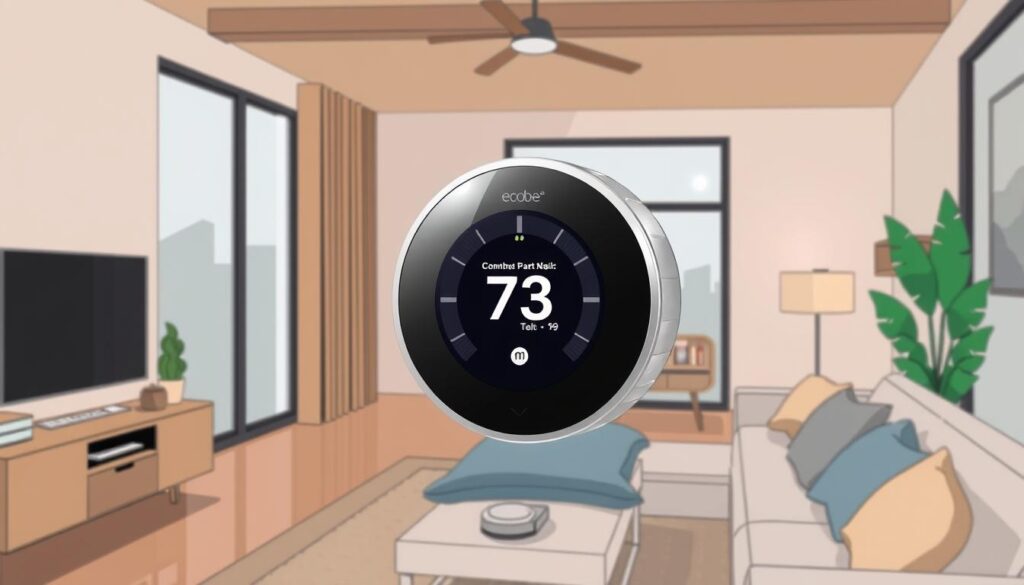
In the scorching Arizona climate, the Ecobee Smart Thermostat Premium proves to be the best overall thermostat. Our tests showed that it maintained a consistently pleasant temperature year-round more effectively than any other model.
Key Features and Specifications
The Ecobee Smart Thermostat Premium comes equipped with a remote SmartSensor that helps balance temperatures throughout your home. It also features a built-in smart speaker compatible with Alexa or Siri, enhancing its smart home integration capabilities. The SmartSensor is particularly beneficial for Arizona homes with western exposure or multi-story layouts.
Performance in Extreme Heat Conditions
The Ecobee Smart Thermostat Premium performed exceptionally well in extreme heat, thanks to its advanced features. The detailed energy reports provide valuable insights into cooling strategies, helping homeowners optimize their energy usage. Additionally, the eco+ feature works seamlessly with Arizona utilities’ time-of-use rate plans, shifting cooling to lower-cost periods when possible.
Pros and Cons for Arizona Homeowners
The Ecobee Smart Thermostat Premium offers several advantages, including its ability to address temperature imbalances with the included sensors. It is also compatible with heat pumps, common in Arizona homes. However, its price is a significant investment, although energy savings typically offset this over time. Some users have noted that the sleek glass display can reflect glare in bright sunlight, and homes without a C-wire may require the Power Extender Kit for installation, adding complexity.
For those considering the Ecobee Smart Thermostat Premium, it’s worth exploring professional installation services to ensure optimal performance and to discuss any specific requirements, such as C-wire needs.
Google Nest Learning Thermostat (4th Gen): Best for Simplified Setup
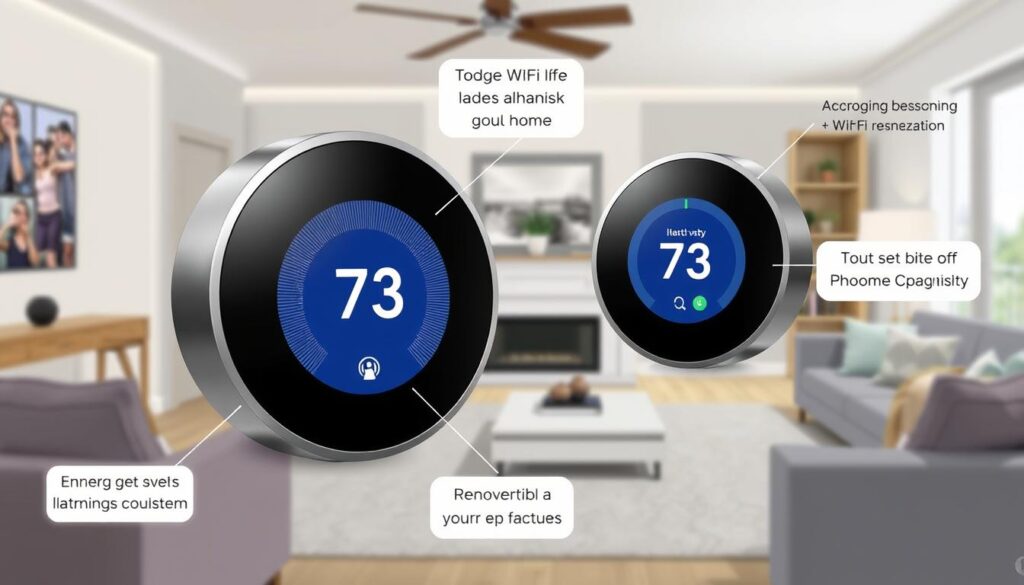
For Arizona homeowners, the Google Nest Learning Thermostat (4th Gen) offers a simplified setup that adapts to the state’s dramatic temperature fluctuations. This thermostat is designed to provide optimal comfort while minimizing the need for manual adjustments.
Key Features and Specifications
The Google Nest Learning Thermostat (4th Gen) boasts several key features, including an upgraded AI that optimizes comfort and energy savings. It doesn’t require a C-wire for most installations, making it compatible with older Arizona homes. The thermostat also features a sleek design that complements modern home aesthetics.
AI Learning Capabilities for Arizona Climate
The learning algorithm of the Nest thermostat quickly adapts to Arizona’s temperature swings, creating an efficient cooling schedule with minimal user input. This capability is particularly beneficial in Arizona’s climate, where temperatures can vary significantly.
Pros and Cons for Arizona Homeowners
Pros:
- The learning algorithm adapts quickly to Arizona’s climate.
- No C-wire is required for most installations.
- The design is sleek and modern.
- Excellent integration with other Google Nest products.
Cons:
- The optional Nest Temperature Sensors lack occupancy detection.
- Limited compatibility with some smart home platforms.
- Occasional unwanted adjustments during transitional seasons.
- Premium price point.
The Google Nest Learning Thermostat (4th Gen) is a great option for those seeking a hassle-free setup and advanced features tailored to Arizona’s climate.
Amazon Smart Thermostat: Best Budget Option
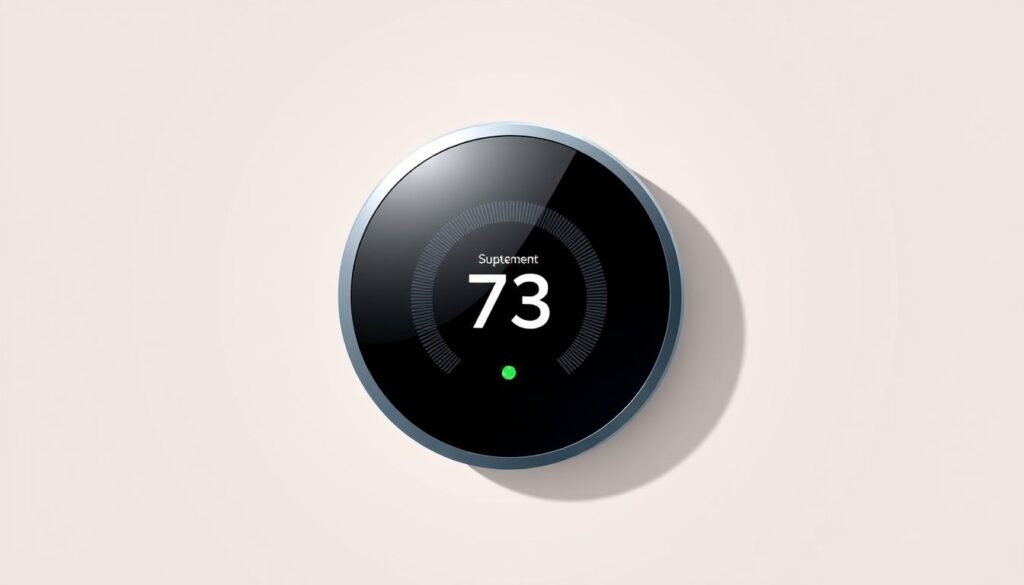
The Amazon Smart Thermostat offers an affordable solution for Arizona homeowners seeking to manage their cooling costs effectively. Despite its budget-friendly price, it comes with features that can help optimize home cooling.
Key Features and Specifications
The Amazon Smart Thermostat is designed with simplicity and ease of use in mind. It can be configured to run on a timed schedule or utilize Alexa Hunches, Amazon’s AI-based learning feature, to suggest customized settings based on your patterns. Energy Star certification ensures that it operates efficiently, helping to manage high summer cooling costs.
Performance in High-Temperature Settings
In Arizona’s extreme heat, the Amazon Smart Thermostat performs reliably, maintaining a consistent temperature in your home. While it lacks remote temperature sensors, which can be a drawback in homes with significant temperature variations between rooms, it still provides effective cooling control.
Pros and Cons for Arizona Homeowners
The Amazon Smart Thermostat has several advantages, including its exceptional value proposition, simple and intuitive controls, and compatibility with Alexa for voice control. However, it also has some limitations, such as limited learning capabilities compared to more premium models like Nest or Ecobee, and no support for Apple HomeKit or Google Home, which may limit smart home integration options.
Honeywell Home T9 Smart Thermostat: Best for Temperature Consistency
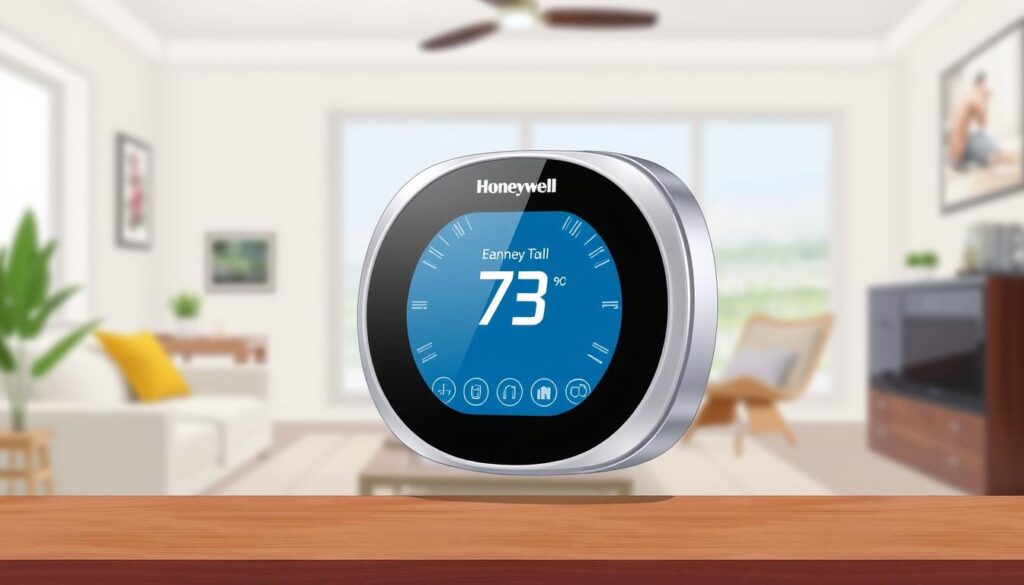
Consistent temperature control is key to comfort in extreme climates, and the Honeywell Home T9 Smart Thermostat excels in this aspect. This smart thermostat is particularly beneficial for homeowners in Arizona, where the desert climate can push cooling systems to their limits.
Key Features and Specifications
The Honeywell Home T9 Smart Thermostat comes equipped with advanced features that make it stand out. It includes multi-room sensor technology, allowing for precise temperature control across different areas of the home. The thermostat is also compatible with various smart home systems, enhancing its functionality.
With its sleek design and user-friendly interface, the Honeywell Home T9 is both functional and aesthetically pleasing, although some users might find it not as visually appealing as some competitors.
Multi-Room Sensor Technology
One of the standout features of the Honeywell Home T9 is its ability to use wireless sensors placed in various rooms to monitor and adjust the temperature. This ensures that the home remains comfortable throughout, even in the most extreme Arizona heat.
The room prioritization feature allows homeowners to target cooling where it’s needed most, potentially saving energy while maintaining comfort.
Pros and Cons for Arizona Homeowners
The Honeywell Home T9 offers several benefits for Arizona homeowners, including its exceptional sensor technology for consistent whole-home comfort and its geofencing feature that optimizes cooling based on the homeowner’s location.
However, it’s worth noting that the additional sensors can be relatively expensive, and the setup process can be more complex, especially when configuring multiple sensors.
Despite these drawbacks, the Honeywell Home T9’s reliability and performance make it a strong contender for those seeking to maintain a comfortable home environment in Arizona’s challenging climate.
Mysa Smart Thermostat: Best for Electric Baseboard Heating
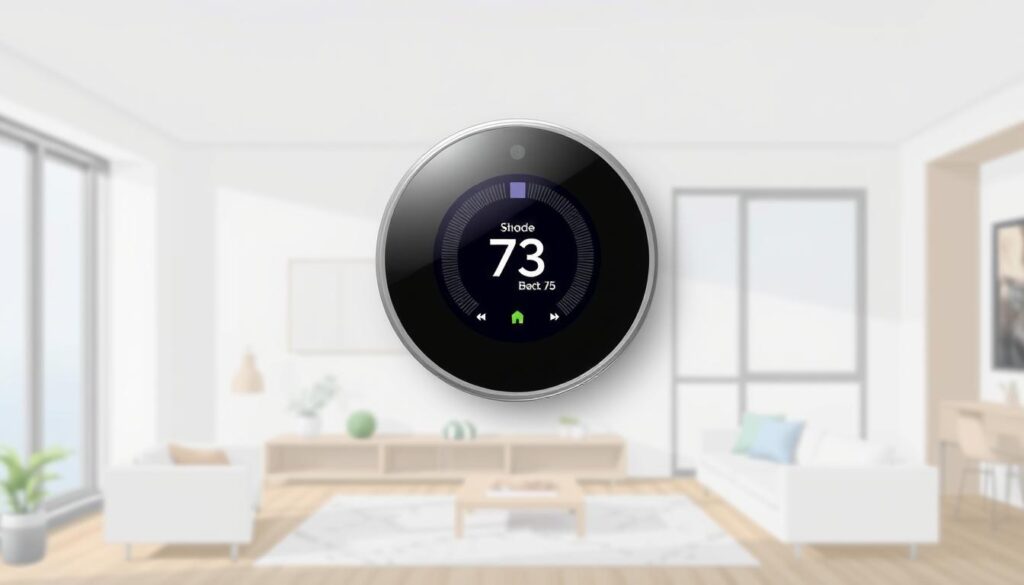
The Mysa Smart Thermostat v2 is designed to optimize electric baseboard heating systems, making it ideal for Arizona homeowners. It offers advanced features like scheduling, geofencing, and an “Eco” mode that can help save energy and money—up to 26% of your annual heating bill, according to Mysa.
Key Features and Specifications
The Mysa Smart Thermostat v2 boasts several key features that make it an excellent choice for managing electric baseboard heating. It provides smart control for electric heating systems, allows for room-by-room temperature control, and is compatible with major smart home platforms.
Some of its notable specifications include:
- Smart scheduling and geofencing capabilities
- “Eco” mode for subtle temperature adjustments
- Zoned approach for room-by-room control
- Compatibility with major smart home platforms
Pros and Cons for Arizona Homeowners
For Arizona homeowners, the Mysa Smart Thermostat v2 offers several benefits, including potential savings on energy bills and enhanced control over electric baseboard heating. However, it’s essential to consider both the pros and cons.
Pros:
- Provides smart control for typically excluded electric heating systems
- Can reduce electric heating costs by up to 26%
- Ideal for heating only the spaces you’re actively using
- Excellent compatibility with major smart home platforms
Cons:
- Doesn’t control cooling systems, requiring separate thermostats
- Installation requires working with high-voltage wiring
- Touch-sensitive controls can be less responsive
- Limited relevance during Arizona’s long summer months
Installation Considerations for Arizona Homes
The installation process of a thermostat in Arizona’s extreme climate requires careful planning and execution. Ensuring that the thermostat is installed correctly is crucial for its performance and longevity.
C-Wire Requirements and Adapters
One crucial aspect to consider during thermostat installation is the C-wire requirement. Many smart thermostats need a C-wire to operate properly. Arizona homeowners should check if their HVAC system has a C-wire or if they need to install an adapter. This is particularly important for homes with older HVAC systems.
For those without a C-wire, adapters or alternative power solutions may be necessary. It’s essential to consult with an HVAC professional to determine the best approach for your specific situation.
Professional vs. DIY Installation in Arizona
Arizona homeowners have the option to install thermostats themselves or hire a professional. DIY installation can be feasible for those with basic tools and standard HVAC configurations, typically taking 30-60 minutes. However, professional installation, which costs between $75-150, includes system testing and optimization specific to desert climate conditions.
For homes with complex HVAC systems, such as zoned systems, professional installation is highly recommended due to the complexity of integrating with zone controllers. Many Arizona HVAC companies offer free or discounted thermostat installation when purchased through them.
Maximizing Energy Efficiency with Smart Thermostats in Arizona
Smart thermostats offer a revolutionary way to optimize energy consumption in Arizona’s extreme heat. By leveraging advanced features such as geofencing, scheduling, and optimal temperature settings, homeowners can significantly reduce their energy bills while maintaining a comfortable living environment.
Optimal Temperature Settings for Desert Climate
Setting the optimal temperature is crucial in Arizona’s desert climate. Smart thermostats can learn how quickly your home heats up and cools down, optimizing start times to reach target temperatures exactly when needed. For instance, scheduling pre-cooling during morning hours when electricity is cheaper can improve system efficiency and reduce afternoon cooling needs.
| Temperature Setting | Energy Consumption | Cost Savings |
|---|---|---|
| 78°F (25°C) | Moderate | Baseline |
| 80°F (27°C) | Reduced | 10%-15% |
| 82°F (28°C) | Low | 20%-25% |
Using Geofencing and Scheduling Features
Geofencing uses your smartphone’s location to automatically adjust temperatures when you leave and return home, eliminating wasted cooling of an empty house. Most smart thermostats allow you to customize the geofencing radius, with 1-2 miles typically providing the best balance between responsiveness and accuracy in Arizona. Combining geofencing with time-based scheduling provides redundancy and maximizes savings opportunities.
By utilizing these features, Arizona homeowners can enjoy a more energy-efficient home without sacrificing comfort. As the data suggests, smart thermostats can lead to significant cost savings, particularly when aligned with utility time-of-use rate plans.
Making the Right Choice for Your Arizona Home
The right thermostat can make a significant difference in managing Arizona’s extreme heat. Choosing the ideal thermostat involves balancing your specific needs, budget, and existing HVAC system capabilities.
For Arizona homeowners, top thermostats offer various benefits. The Ecobee Smart Thermostat Premium provides comprehensive features and exceptional performance, albeit at a premium price. The Google Nest Learning Thermostat balances simplicity and effectiveness, adapting quickly to Arizona’s climate.
Budget-friendly options like the Amazon Smart Thermostat deliver impressive performance at a lower cost. For homes with temperature variations, the Honeywell Home T9’s sensor technology ensures consistent comfort. Consider your smart home ecosystem when choosing a smart thermostat, as compatibility varies between models.
Regardless of the model chosen, a smart thermostat is a valuable investment for Arizona homeowners, typically paying for itself within 1-2 years through reduced cooling costs.

